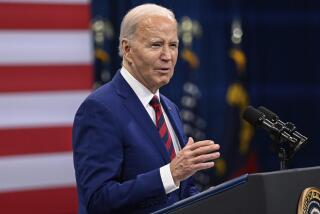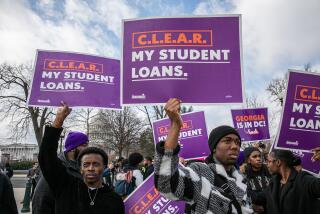Banker gets an earful
WASHINGTON — The Federal Reserve has dramatically expanded its role in the economy over the last 18 months, and the Obama administration has proposed enhancing that authority as part of an overhaul of financial regulations.
But many members of Congress -- Democrats and Republicans -- are seeking to curtail the central bank’s authority instead of expand it.
Worried about the increased power of the complex and mysterious Fed, and upset it did not do more to prevent the deep recession, Capitol Hill has focused its anger over the financial crisis and its aftermath on the central bank. The Fed finds itself at the center of a collision of traditional political concerns -- conservatives’ fears of heavy-handed government intervention in free markets, and liberals’ complaints of regulators who favor corporate executives over average Americans.
More than two-thirds of the House of Representatives has signed on to a bill that would subject the central bank to increased congressional oversight through expanded audits. A key senator wants to strip the Fed of its authority to regulate banks. And the chairman of the House Financial Services Committee wants to rein in the Fed’s emergency lending power, which it used to help engineer the sale of Bear Stearns Cos. and bail out American International Group Inc.
Federal Reserve Chairman Ben S. Bernanke defended the central bank during a congressional hearing Thursday. He reiterated his belief that the Fed was best suited for taking on the major new role the administration had proposed for it -- supervising large financial institutions that pose a risk to the entire economy.
But Bernanke also acknowledged the criticism of the Fed’s actions during the financial crisis, saying he shared congressional frustration.
“There’s nobody more sick and tired of bailouts than me,” Bernanke said.
Still, he appears to be fighting an uphill battle for increased power as Congress works to finish the regulatory overhaul this year.
“There just aren’t a lot of cheerleaders here for expanding the authority of the Federal Reserve,” said Kirstin Brost, a spokeswoman for the Senate Banking Committee.
The Obama administration wants to add to the Fed’s portfolio by giving it the task of supervising large financial firms, such as investment banks, that currently fall outside government banking regulation. That increased power would be offset somewhat by the administration’s proposal to take away the Fed’s authority to write and enforce consumer protection rules for financial products. That power would go to a new consumer agency.
Although the Fed still could end up securing new authority, Bernanke has his hands full just trying to keep his agency from losing power, said Jaret Seiberg, a financial policy analyst with Concept Capital’s Washington Research Group.
“The Fed is running into unprecedented opposition on Capitol Hill,” he said.
“In the Senate, there’s open hostility toward any expansion of the Federal Reserve’s authority. And in the House, you certainly have Republicans looking to focus the Fed solely on monetary policy and strip it of any larger role in financial regulation.”
Rep. Barney Frank (D-Mass.), chairman of the House Financial Services Committee, told Bernanke on Thursday that the panel “will be putting some limitations” on the Fed’s powers. Among those would be increasing congressional authority to audit the Fed and creating the Consumer Financial Protection Agency.
The Federal Reserve is largely known for its often cryptic pronouncements on the economy and its pivotal role in setting interest rates. But the central bank also is a sizable government agency with about 2,100 employees that is a key player in regulating the financial sector. With 12 regional operations, the Fed is also responsible for supervising key parts of the banking system, including bank holding companies, and drafting consumer protection rules.
Critics have complained that the Fed faltered on all fronts leading up to the crisis. Years of low interest rates helped fuel the housing bubble, and lax oversight of financial institutions allowed consumers and banks to engage in increasingly risky behavior.
“If you look at the record here of the failure of the regulatory bodies . . . all roads seem to lead to the Federal Reserve,” said Sen. Richard C. Shelby (R-Ala.).
The Fed is being hit from both sides of the ideological spectrum.
Liberals have sharply criticized it for taking 14 years -- from 1994 to 2008 -- to adopt rules to protect consumers from unscrupulous mortgage lending. The Obama administration has hammered the Fed on that point as well, a major reason it has proposed shifting consumer protection powers from the Fed and other regulators to the new Consumer Financial Protection Agency.
Bernanke has acknowledged the Fed’s failures on consumer protection, which took place largely before he became chairman in 2006, but opposes creation of the agency. Still, he realizes damage has been done to the Fed’s reputation in that area.
“I think the issue is essentially the confidence that Congress has in our focus going forward,” he said.
Rep. Melvin Watt (D-N.C.) didn’t show much confidence, chiding Bernanke for devoting little of his opening remarks at Thursday’s hearing to consumer protection and for later referring to “the minutiae of consumer law.”
At the same time, conservatives have strongly opposed the Fed’s interventions in the economy, which they said have put trillions of taxpayer dollars at risk by vastly expanding the central bank’s lending authority to bail out companies and back other commercial transactions to keep credit flowing.
House Republicans want to scale back the Fed’s power so the bank focuses on monetary policy. And many have opposed the administration’s proposal to give the Fed the new role of supervising large financial institutions, such as AIG, that are not traditional banks but pose a risk to the economy if they fail.
“I’m not alone with my concerns about the Fed as a systemic regulator,” said Rep. Scott Garrett (R-N.J.). Senate Banking Committee Chairman Christopher J. Dodd (D-Conn.) has similar concerns, as do others on his panel. In fact, Dodd has proposed stripping the Fed of all of its bank oversight functions as part of his plan for creating a single banking regulatory agency.
Former Fed Gov. Alice M. Rivlin also said it would be a mistake to increase the Fed’s regulatory powers because it would distract from the central bank’s monetary policy role.
“Do we want to augment the regulatory authority of the Fed? . . . My answer is no,” said Rivlin, a senior fellow at the Brookings Institution. “My sense is many people would be nervous about that augmentation.”
Bernanke tried to allay some congressional concerns Thursday. He endorsed the administration’s proposed creation of an oversight council of regulators to monitor the entire economy for risks, such as that of too many banks overextending themselves with credit-default swaps. But he did not go as far as some wanted.
Some lawmakers have said the proposed Financial Services Oversight Council -- not the Fed -- should have the additional task of supervising large financial firms that are not banks. The council would be headed by the Treasury secretary and include the Fed chairman and other regulators.
Bernanke, however, was steadfast in saying the Fed should supervise those large firms.
Rep. Brad Sherman (D-Sherman Oaks) said the Fed was less revered on Capitol Hill after the crisis, but there still was a worry that failing to follow its advice could lead to more trouble for the struggling economy.
“The Fed is very powerful, and it comes chiefly from fear and awe,” he said.
“I think there’s more fear and less awe than there used to be.”
--
jim.puzzanghera @latimes.com
More to Read
Inside the business of entertainment
The Wide Shot brings you news, analysis and insights on everything from streaming wars to production — and what it all means for the future.
You may occasionally receive promotional content from the Los Angeles Times.










